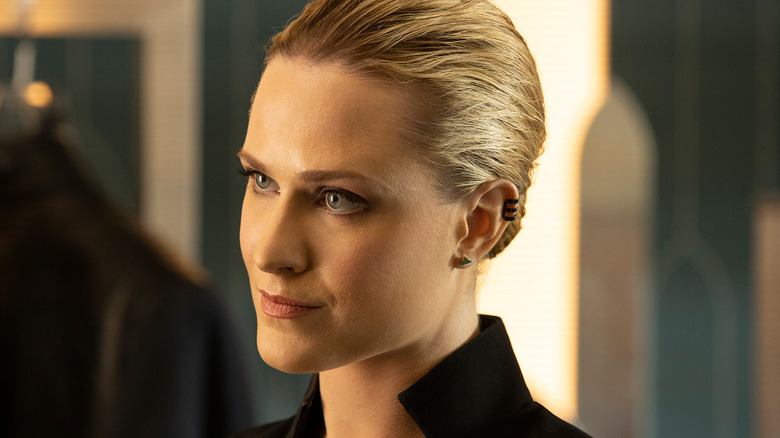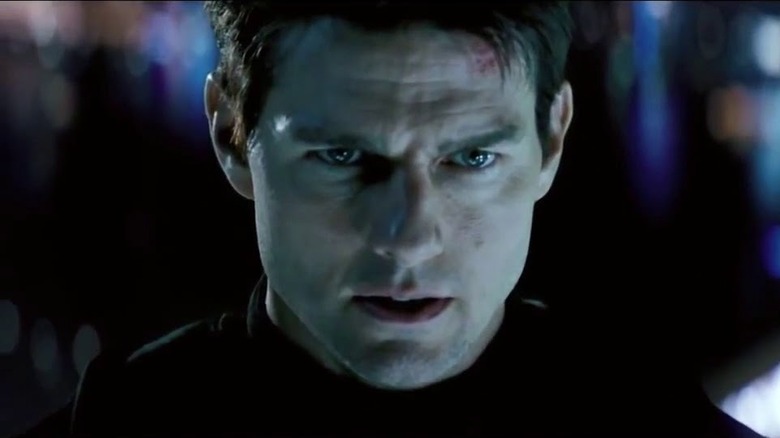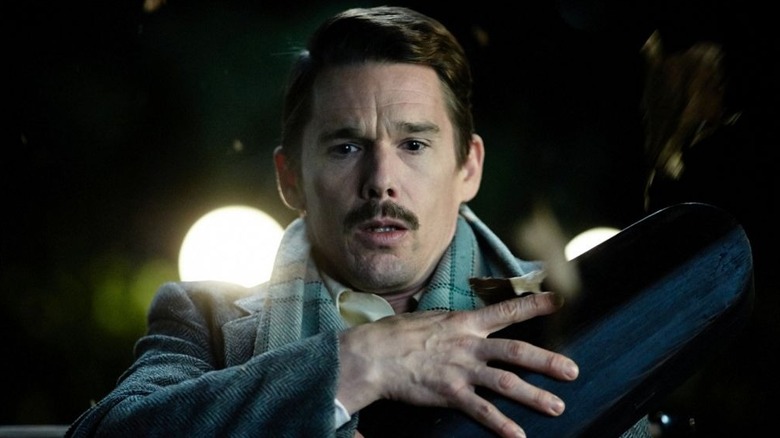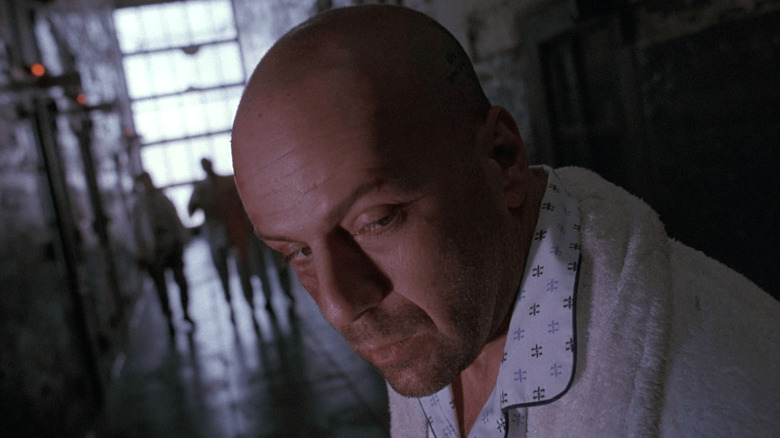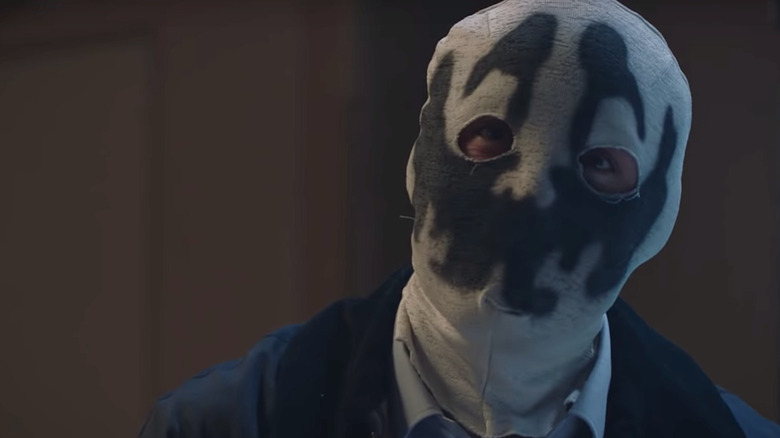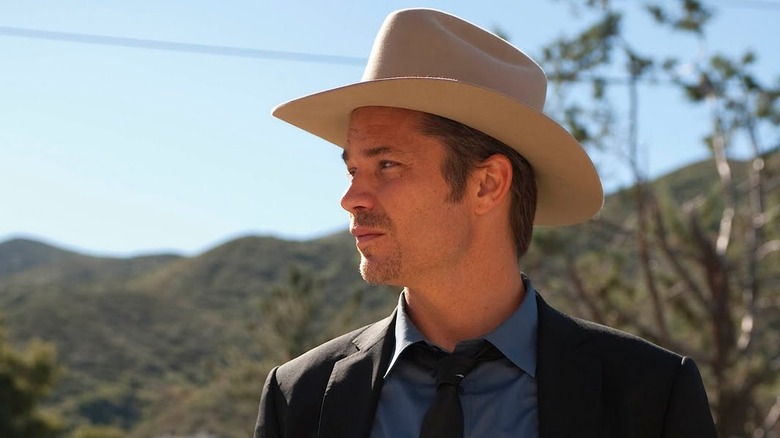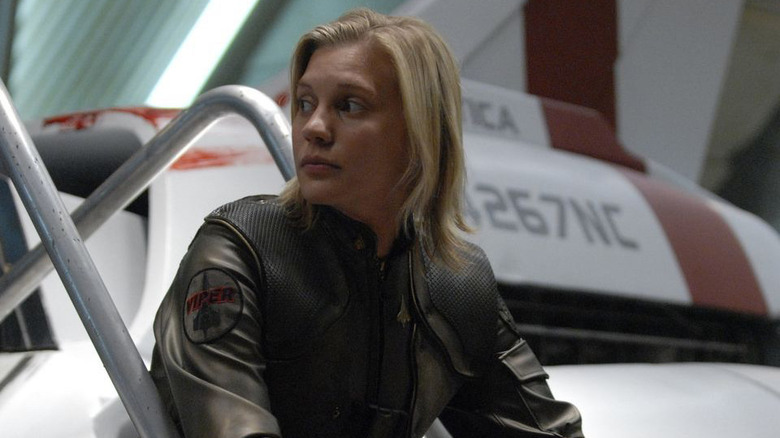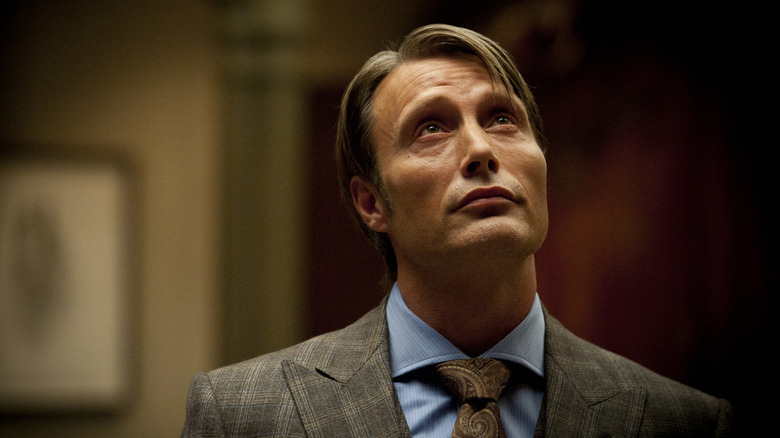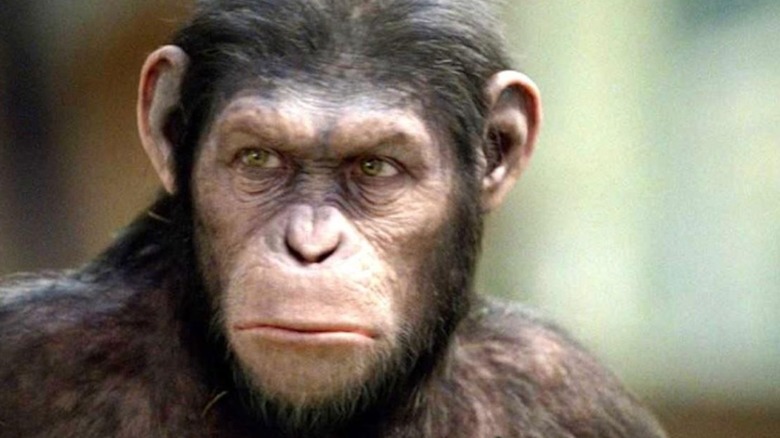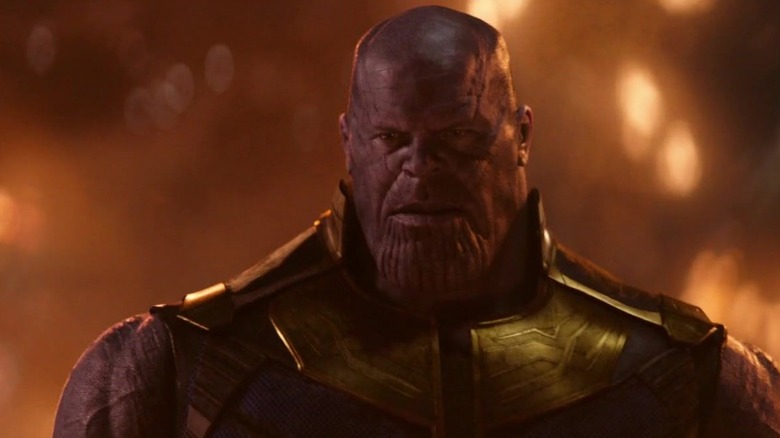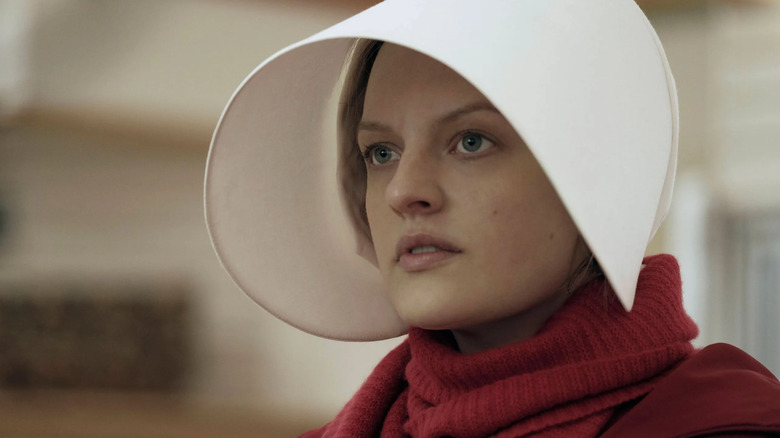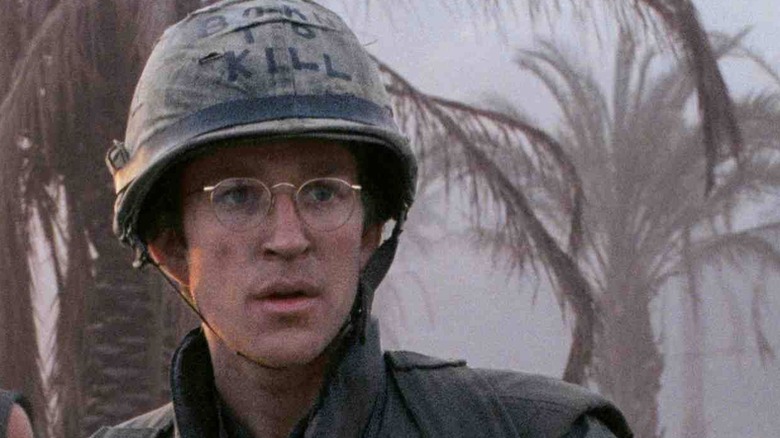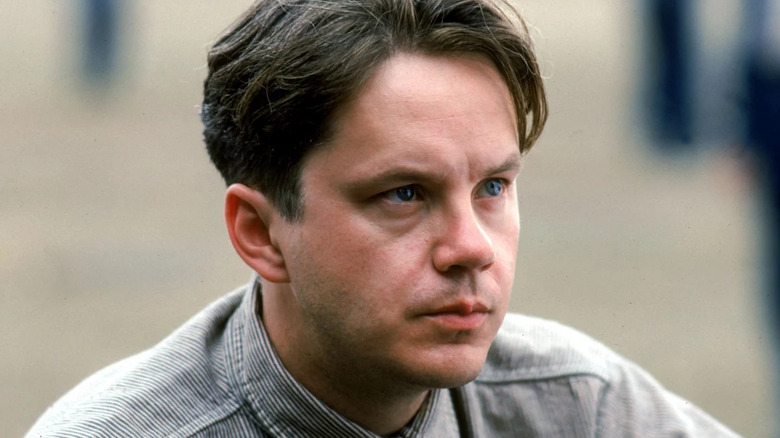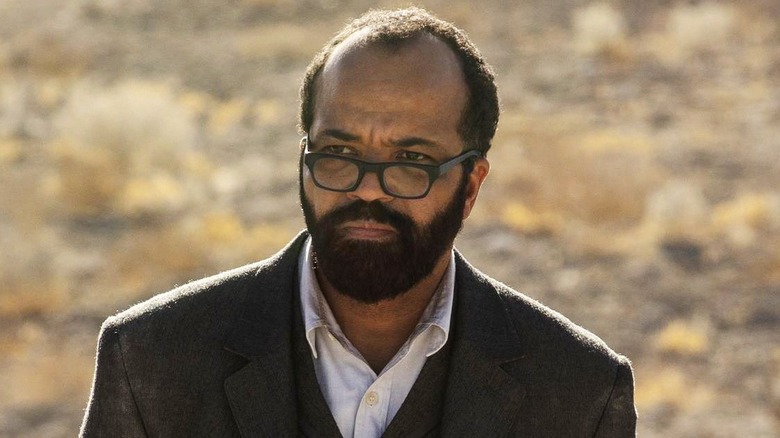Movies And TV Shows That Elevated Their Source Material
Movie and TV studios have long looked to other works — novels, comic books, or even old TV series or movies — to find their next big success story. Remaking a classic or adapting a bestseller must seem like an easy way to guarantee an audience for their project.
But adaptations are tricky. Sometimes turning a different medium into a movie or TV show requires reworking some elements. Writers often alter or remove characters, shift plot points around to fit into the approved run time, and change scenes to heighten the visual drama. Often, that reworking ruins the translation from the page to the screen, disappointing fans of the original source, or, worse, creating a bad movie or show. In rare cases, with the right director and a talented writer, adapting works for the screen elevates the source material, whether by expanding upon it or by bringing new and interesting ideas to the table.
From big blockbuster films to acclaimed small-screen series, here are some movies and TV shows that improved upon their source material.
Mission Impossible
It's easy to forget that "Mission Impossible" was first known for being a hit 1960s TV series with an iconic theme song and the catchphrase "this tape will now self will now self-destruct." Headlined by Peter Graves as Jim Phelps, the TV series boasted an all-star cast in its day that at various points included the likes of Martin Landau ("Ed Wood"), Leonard Nimoy ("Star Trek"), and Sam Elliot ("The Big Lebowski"). The show revolved around a team of secret agents thwarting bombers and would-be terrorists with wrist radios, pocket recorders, and rubber masks.
But 1996's "Mission Impossible" film by Brian De Palma wiped the slate clean. Big stunts and bigger FX replaced the rinky-dink radios and recorders. As the movies continued, the stakes got bigger, too. The twists and turns were more jaw-dropping, with characters whom you never knew if you could really trust. Plus, the movie replaced the show's relatively modest, small-scale missions with globe-trotting, cosmopolitan adventures, with the IMF team using futuristic technology that would impress even Mr. Spock. The stories now covered everything from modern geopolitics and government espionage. It's exceptionally rare for a movie adaptation of a TV show to so confidently and effortlessly one-up its already great source material, but Tom Cruise, De Palma, and others who accepted the impossible mission and did just that.
Predestination
A sorely overlooked science fiction drama from 2014 starring Ethan Hawke, "Predestination" was based on the short story called "All You Zombies" by famed author Robert Heinlein (who also wrote "Starship Troopers"). The original story is told in the form of back-and-forth communiqués between a time-travel agent and his superiors, while the 'zombies' in the title refer to the people in the past he interacts with — people that, from his perspective in the future, are all long dead.
In "All You Zombies," the young time-travel agent must stop a terrorist plot, embarking on a series of complex jumps back and forth through time. By the end of the story, which runs a mere 12 pages in the 1963 collection it appeared in, secrets are revealed in mind-blowing twists that we won't spoil here. While the film does a good job of following the story pretty much beat for beat, it also does so much more, adding some dramatic backstory to the character that fleshes out both him and his world. Though the short story seems like a one-note gimmick (and Heinlein's way of showing off), the movie does more. "Predestination" turns the criminal manhunt into a fascinating examination of identity and LGBTQ+ issues that didn't appear in the original, but feels like a painfully obvious path to take in retrospect. Hawke and the terrorist bomber discover new truths about themselves through their journeys in time.
12 Monkeys
Another time-travel tale, "12 Monkeys" is a classic directed by visionary filmmaker Terry Gilliam ("Brazil"). It follows a man named James Cole as he travels back in time from a post-apocalyptic future to find the source of a deadly plague that would one day wipe out humanity. What many didn't know at the time is that the film was based on a French short film made up entirely of still photographs titled "La Jetée." The Hollywood movie and the French short share all the same major plot points and some similar themes. But Gilliam's "12 Monkeys" is more than just a story about saving the human race through time travel; it is also one man's personal journey to discover and find meaning in his life.
"La Jetée" touches on this, and does have something to say about fate vs free will, but Gilliam expands on these ideas, and uses the bigger canvas to explore themes of sanity and madness and the fine line between them, as well as how society conditions us to accept what someone outside it might consider absurd. Gilliam also adds a good deal of humor. In 2015, an HBO series based on the film premiered on SyFy and took the film's story even further, giving us a broader look at Cole's future apocalyptic world, examining where we are headed as a society and species, and explaining how we might avoid it. While "La Jetée" stands on its own as a beautiful piece of art, Gilliam made a very different and very good version.
Watchmen
Legendary comic book writer Alan Moore famously hates adaptations of his work, often choosing to have his name removed from the credits and to surrender his royalties to his co-creators. Though Moore wants nothing to do with the HBO series based on his groundbreaking graphic novel "Watchmen," artist Dave Gibbons was much kinder, saying he was "blown away" by the series.
The original comics deconstructed the superhero genre, offering one of the first "grounded" takes on costumed vigilantes that broke down their stories and set them in a gritty, realistic version of the world. The HBO series was not an adaptation, but an unconventional sequel to the comic books. "I think the real key was they took it so far away in time from the events of the original comic book," said Gibbons, as the show moved forward some 30 years. The show used the superhero story to look at issues of racism and how historic attitudes have continued to shape our society. It illuminated for audiences a bit of buried history, too, tying in the real-life Tulsa Massacre of 1921. Gibbons described how powerful this kind of storytelling can be, saying, "It's the way in which we change society."
Justified
The short story "Fire in the Hole" by noted crime fiction author Elmore Leonard wasn't the first appearance of his character Deputy U.S. Marshal Raylan Givens, but it was where he first took center stage. It was also the story chosen when adapting the character to the small screen in his own series, "Justified." The short story was the basis for the first episode of the series, introducing viewers to the smooth-talking maverick marshal and his eventual nemesis, criminal miscreant Boyd Crowder. But the FX series elevated the tale from a fun little Western adventure into one of the best shows on TV.
FX's "Justified," from creator Graham Yost, takes a relatively simple story and expands upon the characters, world, and backstory. In the process, he turns Boyd Crowder into one of the most fascinating villains on television. The series reveals and explores the role of Raylan's ex-wife. Just a footnote in the story, she becomes a central character in the series, and one of his closest allies. It gives us Bo Crowder, the overarching villain of the first season, as well as Arlo, Raylan's father, a former ally of Bo whose current feud with the Crowders propels several seasons of stories. "Justified" is perhaps the best example of how to adapt a short story into an ongoing series, with original author Elmore Leonard praising it often before his death in 2013.
Battlestar Galactica
Created by Glen A. Larson (who would later bring us such television classics "Magnum P.I." and "Knight Rider"), "Battlestar Galactica" debuted on TV screens in 1978 and capitalized on the 'ancient astronaut' craze that was gaining steam in the 1970s thanks to the work of Erich Von Däniken and his book "The Chariot of the Gods." It told the story of an alien world of 12 colonies that was decimated by a race of evil robots called Cylons. Without a home planet to return to, the surviving colonists went searching for their lost 13th colony, called Earth. It ran for just one season, and had a disastrous follow-up series, "Battlestar Galactica 1980." But it achieved a cult following for its high-concept storytelling, fun characters, and quality special effects. Despite its relatively short television history, it received a high-profile relaunch in 2003 by former "Star Trek: The Next Generation" writer Ron Moore.
This version of "Battlestar Galactica," however, was quite different than the series on which it was based: darker, more serious, with much more depth. It kept the same core mythology, but then greatly expanded upon it. It revealed a new generation of Cylon robots that could mimic humans, some of whom don't know that they are Cylons, creating a hunt for secret undercover baddies. Instead of being a simple story of space fighters battling evil robots, Moore examines themes of loss and identity, as well as political and social allegories not seen in the original.
Hannibal
Though not a strict adaptation, Bryan Fuller's TV series "Hannibal" is a chilling retelling of events mentioned in Thomas Harris' novel "Red Dragon," as well as elements pulled from his other Hannibal-focused books. Though both earlier films based Harris' first Hannibal work, "Manhunter" and "Red Dragon," were well-received and honor their source material, neither does much to enhance the book they are both based on.
"Hannibal" the series, however, is a visceral, mesmerizing expansion of the backstory of gifted FBI agent Will Graham and his 'friend' Hannibal Lecter, a psychiatrist, FBI consultant, and secret serial killer. The show pulls its cast mostly from "Red Dragon," but also employs characters and situations from Harris' other books, fleshing out events that were only briefly mentioned on the page. The series expands greatly on Will Graham, including a better look at his nearly magical ability to get into the head of a killer, providing even more complexity and depth than he had in the two previous film versions. We also get further into the fascinating and at times almost romantic relationship between Graham and his now-therapist Lecter, something entirely new. "Hannibal" explores the characters and their relationships on a much greater level, which made the series stand out even against its Oscar-winning cousin, "The Silence of the Lambs."
Planet of the Apes
In Pierre Boulle's original French novel "La Planète des Singes," written at the height of the Cold War, he told the story of an astronaut crash-landing on an alien planet ruled by intelligent apes. He used the story to comment on a world seemingly bent on destroying itself, not unlike the world he was living in. Inspired by his experience as a prisoner during the Second World War, he also comments on racism. The first feature film based on Boulle's work is a spirited adventure. It looks at similarly profound themes, but makes a more direct statement to the audience by changing the ending, conveying that Earth destroyed itself and ceded control of the planet to apes.
As meaningful as the 1968 film and original novel are, though, it was the most recent film trilogy that truly elevated the concept. Directors Rupert Wyatt and Matt Reeves were able to take a relatively straightforward story and develop it into a much more intense tale. Instead of jumping forward with each film, as the first movie series had, the new trilogy follows one central ape, Caesar, across the three films. Having one central character allowed for a much more involved story, becoming a more serious take on the material than audiences probably expected given previous efforts. The new trilogy was filled with impressive action, compelling characters, and incredible performances, not to mention the most incredible CGI characters ever seen on screen.
Avengers: Infinity War/Endgame
"Avengers: Infinity War" and "Avengers: Endgame" form a duo that is so vastly transformative of its source material that we hesitate to even call it an adaptation. The original series, written by Jim Starlin and illustrated by George Pérez and Ron Lim, was preceded by a two-part prestige format series titled "The Thanos Quest." But this pair of comic book series, while exciting for fans in 1990 and 1991, were simple adventures. "The Infinity Gauntlet" served as Marvel Comics' annual 'big summer event' crossover, with heroes from across the Marvel Universe teaming up to battle the gem-wielding supervillain.
The films take this concept and give it a life all its own, providing Thanos with a more complex and sympathetic — almost noble — motivation. It takes the 'team-up' premise to new and more exciting places, perhaps by virtue of the fact that at this point in the MCU, most of the heroes had yet to meet one another. It features emotional story beats for characters like Thor, Iron Man, Black Widow, and Captain America, too. Fans often criticize the lack of consequences in the MCU movies. "The Infinity Gauntlet" comic series had some lingering after-effects, but they were relatively minor; meanwhile, the "Avengers: Endgame" had plenty. Killing off major players and having serious repercussions that rippled across the likes of "Loki," "Black Widow," and beyond, "Endgame" marked a major shift in the ongoing universe of movies and TV shows.
The Handmaid's Tale
It's not often that an adaptation can elevate a widely celebrated and recognized work of fiction, but if any has, it's "The Handmaid's Tale." Make no mistake, the novel by Margaret Atwood was both a bestseller and acclaimed by literary critics. The novel sparked debate and discussion on feminism and race, and it still stands today as powerful a work of fiction as it was upon its release.
And then, somehow, the TV series from Hulu expanded upon it and made it an even more powerful work. Perhaps it's because Atwood herself was a consulting producer on the series. Perhaps it's simply because putting visuals to Atwood's ideas made them that much more impactful. Either way, it's an impressive feat that the series managed to pull off. The first season covers the majority of the novel, while further seasons impressively expanded on the world of Gilead with equal intensity. The series helped inspire Atwood to write a sequel novel after nearly 35 years, "The Testaments," released in 2019, even getting actress Ann Dowd from the show to perform her role in the audiobook version.
A high-concept series with such extreme ideas could easily have fallen into absurdity. That the series took a resoundingly acclaimed work and brought it to the screen to near-universal acclaim – in what the New York Times called "unflinching, vital and scary as hell" — makes it a worthy inclusion to this list.
Full Metal Jacket
Since its release, Stanley Kubrick's "Full Metal Jacket" has sparked debates about its philosophical meaning, the ethics of war, and the life of a soldier in Vietnam. It's an elevation of its source material, a novel by Gustav Hasford called "The Short Timers."
Like "The Handmaid's Tale," the original author was involved in the production, in this case as co-screenwriter, which no doubt helped when translating his work to the big screen. The original novel received mixed reviews, with the New York Times praising its evocative battle scenes but calling the plot thin and saying "no character offers any particularly startling insights into the nature of the fighting." The film, on the other hand, received ample praise upon its release for doing exactly that. Characters like Animal Mother, Joker, Cowboy, and Eightball became the subjects of discussion and dissection among movie critics and academics for years, helping it earn a place as one of the best war movies ever made. The impressive first half, set during the soldier's stay in boot camp, is greatly expanded for the movie, and is probably the most notable part of Kubrick's masterpiece. When it comes to improving and elevating a written work, "Full Metal Jacket" stands as perhaps the quintessential example.
The Shawshank Redemption
Based on the Stephen King novella "Rita Hayworth and the Shawshank Redemption," Frank Darabont's Academy Award-nominated film is often cited as one of the greatest films ever made, and once was voted No. 1 in a list of best movies in the history of cinema in an Empire readers' poll (it sits at No. 4 in the updated 2021 poll). The novella is a story of determination and hope, but it's relatively short at just 120 pages, so, like Darabont's second King adaptation, "The Mist," "Shawshank Redemption" adds a lot of material.
Darabont makes the most of that added material, giving far more background and attention to side characters like Elwood and Brooks. This attention to detail makes the movie far more emotionally devastating — and ultimately inspiring — than anything found on the page. Some of the most beautiful and moving moments are exclusive to the film. The movie has some significant elements removed from the novella too, with some of King's graphic violence and gore smartly excised or dulled. The movie instead focuses on the personal drama and pathos of Andy Dufresne. Even King himself seems to understand how much the film improved and elevated his story, saying the movie "is its own thing — an American icon — and I'm delighted to have been a part of it."
Westworld
It's incredible to think that HBO's "Westworld," the genre-bending, borderline experimental sci-fi Western, was adapted from a largely forgotten adventure movie from 1973. The movie's two early spinoffs, "Futureworld" and "Beyond Westworld" were critically panned and short-lived, but attempts were made to revive the film as far back as the late '90s, when Arnold Schwarzenegger was rumored to be taking the role of the 'Man in Black' originally played by Yul Brynner.
Either way, HBO's reboot takes the concept of a Wild West theme park gone haywire and makes it more than just an action vehicle. Reviews call the series innovative and enthralling. "Westworld" is as immersive as the theme park itself, captivating audiences almost immediately with its complex timelines and mysteries that have us looking for clues in every scene. Not since "Lost" had viewers debated and discussed a series as much as "Westworld." And while the original movie served as inspiration for certain characters, the TV series creates an entirely new cast of engrossing heroes and villains. The series deals with serious topics like determinism and the dangers of artificial intelligence, plus relevant social issues of the day, like data mining, how society controls its members, and how our desire for progress can endanger our future. The third season goes even further, exploring ideas like class struggle, turning a fun little sci-fi romp into a cautionary, thought-provoking tale.
